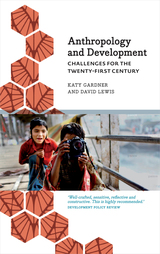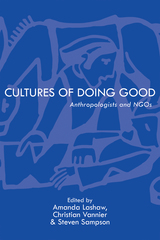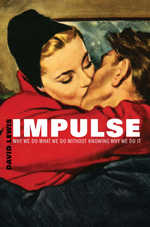

Cultures of Doing Good: Anthropologists and NGOs serves as a foundational text to advance a growing subfield of social science inquiry: the anthropology of nongovernmental organizations (NGOs). Thorough introductory chapters provide a short history of NGO anthropology, address how the study of NGOs contributes to anthropology more broadly, and examine ways that anthropological studies of NGOs expand research agendas spawned by other disciplines. In addition, the theoretical concepts and debates that have anchored the analysis of NGOs since they entered scholarly discourse after World War II are explained.
The wide-ranging volume is organized into thematic parts: “Changing Landscapes of Power,” “Doing Good Work,” and “Methodological Challenges of NGO Anthropology.” Each part is introduced by an original, reflective essay that contextualizes and links the themes of each chapter to broader bodies of research and to theoretical and methodological debates. A concluding chapter synthesizes how current lines of inquiry consolidate and advance the first generation of anthropological NGO studies, highlighting new and promising directions in this field.
In contrast to studies about surveys of NGOs that cover a single issue or region, this book offers a survey of NGO dynamics in varied cultural and political settings. The chapters herein cover NGO life in Tanzania, Serbia, the Czech Republic, Egypt, Peru, the United States, and India. The diverse institutional worlds and networks include feminist activism, international aid donors, USAID democracy experts, Romani housing activism, academic gender studies, volunteer tourism, Jewish philanthropy, Islamic faith-based development, child welfare, women’s legal arbitration, and environmental conservation.
The collection explores issues such as normative democratic civic engagement, elitism and professionalization, the governance of feminist advocacy, disciplining religion, the politics of philanthropic neutrality, NGO tourism and consumption, blurred boundaries between anthropologists as researchers and activists, and barriers to producing critical NGO ethnographies.

“It seemed like a good idea at the time” has been the limp excuse of many a person whose actions later became cause for regret. Although we see ourselves as rational beings, we are far more likely to act according to impulse than logic. Nor is this always a bad thing, David Lewis suggests. Impulse explores all the mystifying things people do despite knowing better, from blurting out indiscretions to falling for totally incompatible romantic partners. Informed by the latest research in neuropsychology, this eye-opening account explains why snap decisions so often govern—and occasionally enrich—our lives.
Lewis investigates two kinds of thinking that occur in the brain: one slow and reflective, the other fast but prone to error. In ways we cannot control, our mental tracks switch from the first type to the second, resulting in impulsive actions. This happens in that instant when the eyes of lovers meet, when the hand reaches for a must-have product that the pocketbook can’t afford, when “I really shouldn’t” have another drink becomes “Oh why not?” In these moments, our rational awareness takes a back seat.
While we inevitably lose self-control on occasion, Lewis says, this can also be desirable, leading to experiences we cherish but would certainly miss if we were always logical. Less about the ideal reasoning we fail to use than the flawed reasoning we manage to get by with, Impulse proves there is more to a healthy mental life than being as coolly calculating as possible.

While we know a great deal about the benefits of regional integration, there is a knowledge gap when it comes to areas with weak, dysfunctional, or nonexistent regional fabric in political and economic life. Further, deliberate “un-regioning,” applied by actors external as well as internal to a region, has also gone unnoticed despite its increasingly sophisticated modern application by Russia in its peripheries.
This volume helps us understand what Anna Ohanyan calls “fractured regions” and their consequences for contemporary global security. Ohanyan introduces a theory of regional fracture to explain how and why regions come apart, consolidate dysfunctional ties within the region, and foster weak states. Russia Abroad specifically examines how Russia employs regional fracture as a strategy to keep states on its periphery in Eurasia and the Middle East weak and in Russia's orbit. It argues that the level of regional maturity in Russia’s vast vicinities is an important determinant of Russian foreign policy in the emergent multipolar world order.
Many of these fractured regions become global security threats because weak states are more likely to be hubs of transnational crime, havens for militants, or sites of protracted conflict. The regional fracture theory is offered as a fresh perspective about the post-American world and a way to broaden international relations scholarship on comparative regionalism.

Thaddeus “Thad” Mosley is a self-taught African American sculptor. Earning a living throughout his adult life as a postal worker in Pittsburgh, Pennsylvania, so that he could support his family by day and work as a sculptor by night, he has evolved an individual and powerful African American voice. He worked alone, patiently developing a sculptural language absolutely his own, yet traceable to his primary sources of inspiration, the vitality of African art and American jazz on the one hand, and on the other, two twentieth-century artists, the Romanian sculptor Constantin Brancusi and the Asian American sculptor Isamu Noguchi.
From the beginning Thad Mosley has been a carver. His materials have always been those “at hand,” logs from the trees of his native Western Pennsylvania, stones from the sites of demolished buildings in Pittsburgh, and metals from local scrapyards. Finding within each log or block of stone an essential vitality, his carvings invariably bear a syncopation of chisel marks evoking the rhythms and surging freedoms of jazz. Mosley’s perseverence and his pride in who he is offer an inspiring example of the unquenchable spirit of a true artists.
This short book introduces the life and work of this remarkable man. Davis Lewis, architect, writer, and painter, has been a friend of the artist for twenty-five years. His narrative is distilled from hours of taped interviews with Thad Mosley, as well as from a deep understanding of his art and influences. Lonnie Graham is a nationally known African-American photographer.
READERS
Browse our collection.
PUBLISHERS
See BiblioVault's publisher services.
STUDENT SERVICES
Files for college accessibility offices.
UChicago Accessibility Resources
home | accessibility | search | about | contact us
BiblioVault ® 2001 - 2024
The University of Chicago Press









